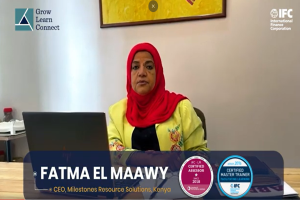Coaching: The key element for successful implementation of a sustainable Food Safety Management System
IFC has recently developed a set of guidelines for coaching food safety teams as every Food Business needs consistent coaching for the successful implementation of a sustainable Food Safety Management System (FSMS), training alone is not enough.
Research by the University of Wales shows that 59% (Invest wisely in Food Safety) of the food handlers do not carry out all the food safety behaviors taught during training. The reason behind this could probably be that the training had guaranteed that the food handlers learned new knowledge, skills, and attitude but the learning had to be converted to practices that influence the business performance. To get it right, the food safety team requires coaching to not only establish the correct procedures but also ensure all necessities are in place so that the people perform these tasks without negligence. Coaching should also cover monitoring the effectiveness of these practices that are reviewed and updated regularly.
IFC is investing in food safety projects worldwide (www.ifc.org/foodsafety). IFC clients include agri-food processors, manufacturers, distributors, food services, food retailers, and their suppliers. IFC’s food safety specialists and consultants help private sector clients implement Food Safety Management System (FSMS) recognized by the Global Food Safety Initiative (GFSI). The role of the specialist or consultant starts with understanding the current status of the food business and generally completes with the client’s achievement of a food safety certificate. Some projects go beyond one cycle of FSMS implementation.
IFC uses the “assess, train, and coach” model for FSMS implementation, where the food safety specialist or consultant dedicates more time for coaching than training. Performing an initial assessment is the first important step to understanding the current food safety status of a Food Business. A thorough initial assessment report, which highlights the gaps between the current status and the requirements in the desired food safety management system and provides an implementation plan, is a blueprint for the consultant and the food safety team. The consultant leads and empowers the client food safety team until they have successfully implemented the FSMS and get certified.
An FSMS implementation is a learning and development program that aims to ensure the Prerequisite Programs (PRPs), Hazard Analysis and Critical Control Point (HACCP) and other elements of the Food Safety Management System are in place. Another important aspect is to ensure that personnel is competent to perform the task in the way food safety risks are reduced to an acceptable level if not eliminated.
Regarding the Kirkpatrick Model’s four levels of learning effectiveness, training may guarantee the first two levels – reaction and learning – however, coaching is the tool to reach the top two levels – changing practices and influencing performance. IFC food safety training targets the participant to learn new knowledge and skills and change the attitude toward food safety. They are designed to efficiently scan the background knowledge of the food safety team, effectively link between their current knowledge and their future knowledge so that the participants can readily adopt the new knowledge. Since COVID-19 hit the world, the IFC team has shifted the training sessions from meeting rooms to online modalities. To learn more about IFC Food Safety training, you may refer to Chapter 5: Food Safety Training in the IFC Food Safety Handbook
After training the food safety team, the consultant will follow up with consistent coaching sessions to ensure the team transfers the new knowledge into practices, and their new practices have a significant influence on the safety of their food products.
Particularly in FSMS implementation, the objectives of coaching food safety teams are to develop and/or amend the procedures in the way they meet the FSMS requirements, to ensure personnel performs the tasks according to the procedures, and to verify each element of FSMS is regularly reviewed and updated. Coaching is even more important for sustaining the globally recognized food safety certificates like FSSC 22000 or BRC. Such Food Safety certificates require unannounced surveillance audits. The food business needs to be audit-ready even after the consultant has completed the implementation. Also, certificates are only one of the indications of FSMS in place. The essence of having FSMS in place is for food businesses to “practice” as it has been declared on the certificate. Coaching is the way to ensure the right practices are in place.
IFC developed a set of guidelines to help its food safety consultants to deliver a consistent advisory service across all IFC Food Safety projects. Each food business is different in terms of business size, food processes involved, local norms, and organization culture. Training and coaching requirements also vary depending on the complexity of the business thus there is no one-size-fits-all solution in coaching food safety teams. The manual does not replace the knowledge, skills, and experience of a food safety consultant. Instead, it paves way for the consultant to gradually empower the client food safety teams in establishing and maintaining an effective FSMS.
The coaching guidelines are designed to ensure requirements in the Global Food Safety Initiative (GFSI) checklist, ISO 22000-2018 food safety standard, and ISO Technical Specification ISO/TS22002-1 are fulfilled. The coaching process generally is composed of three phases – conducting further detailed assessment and step by step implementation of each PRP/HACCP/ element of FSMS according to GFSI, ISO22000-2018 standard, or ISO/TS 22002-1 requirement. Under each PRP/ HACCP/element of FSMS, the system requirements and activities to maintain and update each in the system effectively are described. In addition to the above checklist and standards, the manual also covers step-by-step guidance to Food Defense and Food Fraud since it has become more important for food safety. Our newly developed IFC Guideline for Coaching on Food Safety will include step by step approach for coaching food safety teams, tips for virtual training and coaching, and a sample project tracker. Watch out on our website www.ifc.org/foodsafety
Author(s)





